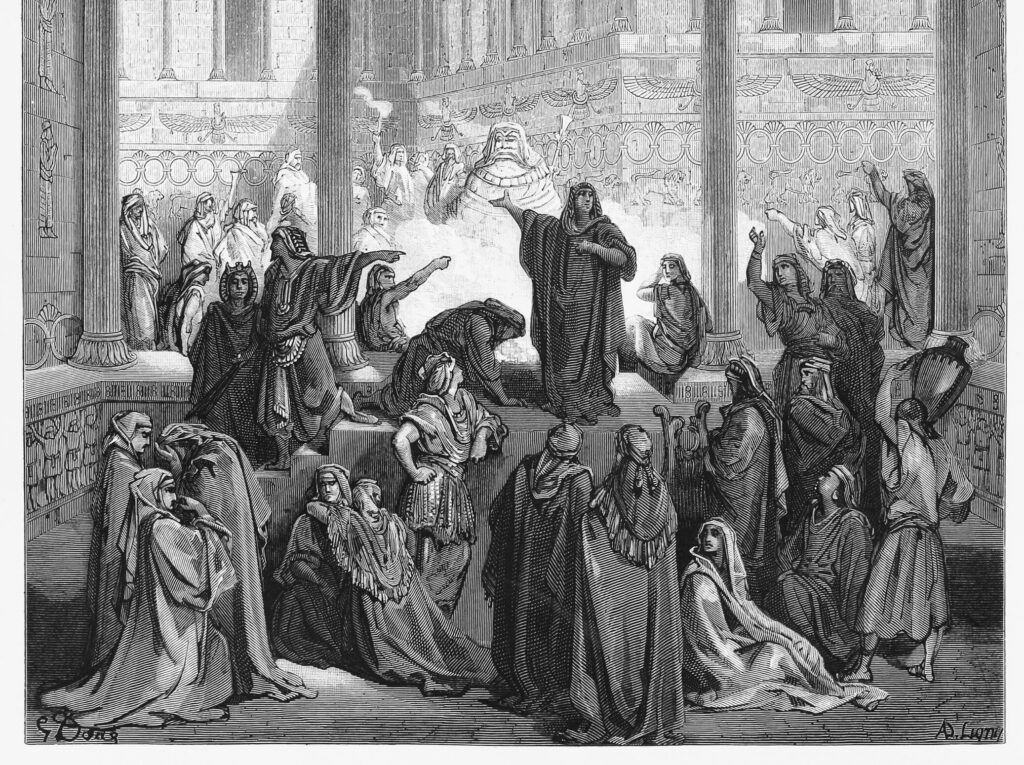In an earlier article, we defined the Old Testament Apocrypha as a collection of Jewish books written from the fourth to the first centuries B.C., included in and apparently canonized in the Greek Old Testament (the Septuagint or LXX) of Alexandria, Egypt. This collection contains works of wisdom, legend, history, and at least one apocalypse. Though some of these works were originally written in Hebrew, others were written in Greek. Our best and most complete collections of these Apocryphal works today survive in Christian manuscripts of the Greek Old Testament dating from the fourth and fifth centuries A.D.
The common theme of almost all the Apocryphal books is the need for Jews to survive as Jews in hostile cultures. The Apocryphal works describing earlier times, such as Judith, Tobit, and the additions to Daniel and Esther, speak of Jews during times of foreign conquest and captivity. The Apocryphal works describing life in Hellenistic times speak of Jews resisting Greek culture. Either way, one can read these works with a degree of sympathy, for it was difficult to remain faithful to Jewish life in a hostile world.
So, what’s in the Apocrypha? In this article, we will give an overview of the eighteen most commonly included books of the Apocrypha (although not all of these make the cut in every list). We’ll list each with a brief description and then include a quote from each to give you just a taste. The order here is that found in the Common English Bible translation, which includes all eighteen books of the Apocrypha.
Tobit
This warm and heartfelt biographical book tells the story of a righteous but blind Jewish businessman, Tobit, living in Assyrian exile. He sends his son, Tobias, to recover a large amount of his money from a foreign land. Guided by the angel Raphael, Tobias marries a cousin, Sarah, casting a demon out of her, and then restoring Tobit’s sight. The book was popular in both ancient and recent times, and survives in manuscripts in Greek, Latin, Syriac, Hebrew, and Ethiopic. The book contains 14 chapters.
Quote: “Tobias said to Raphael, ‘Brother Azariah, I’ve heard that she has already been given to seven men and that they died in the bridal chamber. They dropped dead the very night they tried to have sex with her. I’ve heard people saying that a demon kills them. Now I’m also afraid, because the demon loves her and doesn’t harm her but kills anyone who desires to approach her….’ Raphael said to him, ‘Don’t you remember your father’s instructions, that you should take a wife from among your father’s relatives? Now listen to me, my brother: Don’t worry about this demon. Take her, for I know that tonight she will be given to you as your wife. When you enter into the bridal chamber, take some of the fish’s liver and heart and lay them over the warm incense coals. This will let off an odor, and the demon will smell it, flee, and never stalk her again.’” (Tobit 6:14-18, CEB)
Judith
This popular, historical-type book tells the story of a beautiful woman named Judith, who managed to trick the general of the invading Assyrian army into sleeping with her. She then beheaded him, causing the Assyrian army to flee, and saving her Israelite city of Bethulia. The book survives in several languages and was a favorite subject of later poets and artists. Judith contains 16 chapters.
Quote: “So everyone went out, and there was no one left with them in the bedroom, either small or great. Then Judith stood next to his bed and said in her heart, Lord, God of all power, look at this hour upon the work of my hands for the glory of Jerusalem. Now is the time to help your inheritance and to accomplish my plans to destroy the enemies who have risen up against us. Then she went to the bedpost near Holofernes’ head and took down his sword. When she came closer to the bed, she grabbed the hair on his head and said, ‘Give me strength today, Lord God of Israel.’ She struck him in the neck twice with all her might and cut off his head.” (Judith 13:4-8, CEB)
Additions to Esther
The Greek translation of the Hebrew book of Esther contains additions not found in Hebrew. There are six such additions, which were possibly added by a certain Jew named Lysimachus, who is mentioned at the end of the additions (10:3[11] in the CEB). These additions were originally all at the end of the Hebrew text, but through the centuries they were awkwardly inserted into the narrative at various places. They include, in order of appearance, a dream of Mordecai, a supposed copy of the king’s edict, prayers of Mordecai and Esther, the story of how Esther approached the king, the purported text of the king’s reversal edict, and an interpretation of Mordecai’s dream. The additions contain 107 verses in Greek that the Hebrew text doesn’t have.
Quote: “Mordecai said, ‘These things came from God. I remember the dream that I had about these things. Not one aspect of it failed to come true. There was the little spring that became a great river, and there were light and the sun and an abundance of water. The river is Esther, whom the king married and made queen. The two dragons are Haman and myself.’” (Esther 10:3[2-4], CEB)
Wisdom of Solomon
Generally dated to the mid-first century B.C. or even later and originally written in Greek, the central theme of this book is wisdom itself, which is, at times, personified. In the book, wisdom, virtue, and righteousness are established as the aim of life. Also presented are discussions of justice to the righteous, the foolishness of idolatry, and a focus on the eternal. The book blends Jewish wisdom and Greek ideals (especially Stoicism). Probably written in Alexandria, Wisdom of Solomon contains 19 chapters.
Quote: “Yes, I’m speaking to you who rule with unbridled might so that you may learn wisdom and avoid going astray. Those who have treasured holy things in a holy way will themselves be made holy. Those who have been instructed in holy things will be able to offer a defense for what they have done. So desire my words with all your heart. Commit yourself to them, and you will be educated.” (Wisdom of Solomon 6:9-11, CEB)
Sirach
Similar to Wisdom of Solomon, Sirach (also known as Jesus ben Sirach or Ecclesiasticus), is the longest book in the Apocrypha. This is the only Old Testament Apocryphal book whose author is known: “Jesus, son of Sirach, son of Eleazer of Jerusalem” (50:27). The book praises and encourages wisdom as applied to various aspects of life: business, speech, charity, growing up, money, marriage, child-rearing, friendship, and politics. Wisdom is interpreted as virtuous conduct in each of these areas of life. Originally written in Hebrew, it was translated into Greek early on. The book contains 50 chapters.
Quote: “Indulge children, and they will terrorize you; play with them, and they will grieve you. Don’t laugh together with them, so that you don’t suffer together and in the end grind your teeth in regret. Don’t give them free rein in their youth. Bruise their sides while they are still young, or else they will become stubborn and disobey you. Educate your children, and work on them, so that you don’t end up offended by their shameful behavior.” (Sirach 30:9-13, CEB)
Baruch
Traditionally attributed to Baruch, Jeremiah’ scribe, the work purports to be a statement given from Jeremiah through Baruch to the Jews of Babylonian captivity. It contains an acknowledgement of God’s justice in punishing the Jews, a confession of national sin, a statement of virtue, and a hopeful call for the Jews to prepare to return to Jerusalem in divine favor and joy. Originally written in Hebrew, the work is likely from the second century. Baruch contains five chapters.
Quote: “Get up, Jerusalem! Stand on the high place, and look around to the east! See your children gathered from the west to the east by the holy one’s word, as they rejoice that God has remembered them. They went out from you on foot, driven along by their enemies, but God will bring them back to you, carried aloft with glory as on a royal throne. God has ordered every high mountain and the eternal hills to be brought down, and the valleys to be filled in to level the ground so that Israel may walk safely in God’s glory. The woods and every fragrant tree have shaded Israel with God’s command. God will lead Israel with gladness by the light that shines forth from his glory, with the mercy and righteousness that come from him.” (Baruch 5:5-9, CEB)
Epistle of Jeremiah
Written as though it were from Jeremiah, this work is often attached to the end of the book of Baruch. It is a scathing polemic against idolatry, extolling monotheism to the Jews living among idolatrous cultures. The book was originally written in Greek during the second or first century B.C. The Epistle of Jeremiah contains one long chapter.
Quote: “A carpenter smooths out the tongues of the idols. They are covered in gold and silver, but they are fake and unable to speak. The Gentiles take gold and place crowns on their gods’ heads, like a young girl playing dress up. Sometimes the priests secretly take away the gold and silver from their gods to spend on themselves and give to prostitutes in the brothels. The Gentiles dress these gods of silver, gold, and wood with clothing just like people. But these idols can’t be rescued from rust and rotting. Even though the idols are dressed in rich purple clothing, the Gentiles have to wipe off the idols’ faces because of the dust in the temple that thickly covers them. One idol has a royal staff, like a person who is a regional judge, but the idol can’t destroy the person who offends it. Another one has a dagger or an ax in its right hand, but it can’t defend itself from war or robbers. Clearly they are no gods, so don’t be afraid of them.” (Epistle of Jeremiah 1:7-14, CEB)
Prayer of Azariah
Purporting to be the prayer that Azariah (i.e., Abednego of the book of Daniel) prayed while standing in the fiery furnace along with Shadrach and Meshach, this book is sometimes inserted into the canonical book of Daniel. It contains a confession of national sins and a “song of three young men” praising God’s greatness. Originally written in Greek in the second or first century B.C., this book contains one long chapter.
Quote: “Blessed are you, sitting on the winged creatures, looking down into the farthest depths, worthy of praise and raised high above all others forever. Blessed are you on your royal throne, worthy of hymns and raised high above all others forever. Blessed are you in the dome of the sky, worthy of hymns and honored forever. All works of the Lord, bless the Lord, sing hymns, and lift God high above all others forever. Heavens, bless the Lord, sing hymns, and lift God high above all others forever.” (Prayer of Azariah 1:31-35, CEB)
Susanna
This work tells the story of a beautiful and virtuous Jewish woman during the Babylonian captivity who is falsely accused of adultery by two elders whose advances she refused. Daniel intercedes for Susanna, noting discrepancies in the elders’ accusations. The elders are found guilty of fabricating the story and executed, and Susanna is vindicated. Susanna is a story of virtue and moral integrity. The book is often found inserted into the Greek translations of Daniel and contains only one, fairly-long chapter.
Quote: “When the female servants went out, the two elders stood up and ran at her. They said, ‘Look, the gates are locked, and nobody can see us. We desire you, so do what we want and have sex with us. If you don’t, we’ll swear that you were meeting with a young man, and that’s why you sent your female servants away.’ Susanna groaned. ‘I’m trapped! If I do this, it’s death; but if I don’t, I still won’t escape your plotting. But I’d rather not do this and fall into your hands, than sin in the Lord’s sight.’” (Susanna 1:19-23, CEB)
Bel and the Dragon
This work, often inserted into the Greek copies of Daniel, tells two stories. The first is how Daniel proved that Cyrus’s idol of Bel was not alive, by showing the footprints of Bel’s priests as evidence they the priests themselves, not Bel, were eating Bel’s food. The second story tells how Daniel killed a dragon by feeding it a mixture of pitch, fat, and hair and thereby proving it wasn’t a god. The book contains one chapter.
Quote: “The king honored Bel and worshipped it daily, but Daniel worshipped his own God. So the king said to him, ‘Why don’t you worship Bel?’ He said, ‘I don’t honor idols made by humans, rather the living God who created heaven and earth and has authority over all living things.’ The king said to him, ‘You believe Bel is a living god, don’t you? Haven’t you seen how much he eats and drinks every day?’ Daniel laughed and said, ‘Don’t be taken in, Your Majesty! This is clay on the inside and brass on the outside. It hasn’t eaten or drunk anything, ever!’” (Bel and the Dragon 1:4-7, CEB)
1 Maccabees
Written around 80 B.C. and originally written in Hebrew, the book narrates the events leading up to and including the Jewish revolt against the Seleucids, especially against the tyranny of Antiochus Epiphanes. In so doing, it describes the rise of the house of Simon, brother of Judas Maccabeus—a house known as the Hasmonians. The book advocates for strict observance of the Jewish Law in the face of extreme Hellenistic pressure. The Hebrew text has been lost, and we have only Greek editions of 1 Maccabees. This book contains 16 chapters.
Quote: “In the year 170, the yoke of the Gentiles was removed from Israel. The people of Israel began to write in their documents and contracts, “In the first year of Simon the great high priest, commander and leader of the Jews.” (1 Maccabees 13:41-42 CEB)
2 Maccabees
Written in the mid-first century B.C. in Greek, 2 Maccabees gives a history from a Pharisaic viewpoint of the Maccabean wars from 176 B.C. until the death of Nicanor in 161 B.C. 2 Maccabees is somewhat parallel to 1 Maccabees, discussing the hostility of the Greek rulers to faithful Jews. It mentions Hanukkah, the festival celebrating the recapture of the Temple from Antiochus IV Epiphanes. Further, 2 Maccabees speaks about the resurrection of the dead, a doctrine that would be central to the New Testament. This book contains 15 chapters.
Quote: “Shortly afterward the king sent out an Athenian elder to force the Jews to turn away from their ancestral laws and stop living according to God’s laws. He was also ordered to defile the temple in Jerusalem and to rename it for Zeus Olympus, and to rename the temple in Mount Gerizim for Zeus, Friend of Strangers, just as the people living there requested. The onslaught of this evil was severe and hard for all to bear. The Gentiles filled the temple with wild partying and sexual indulgence. They were entertaining themselves with prostitutes and having sex with women in the priestly chambers. In addition, they carried in unfit things, and the altar was illegally covered with offerings forbidden by the laws. It was impossible to keep the Sabbath or the ancestral festivals, or even simply to profess to be a Jew.” (2 Maccabees 6:1-6 CEB)
1 Esdras
This historical-type book is very similar to Ezra and Nehemiah in the Bible, even quoting extensively from them, as well as from 2 Chronicles 35-36. It appears to be a telling of Ezra’s life for those who might be unfamiliar with the Hebrew book of Ezra, beginning with the Jewish captivity and telling of the Jewish return to Israel. Esdras is Greek for Ezra. 1 Esdras has 9 chapters.
Quote: “Then each bodyguard composed his own statement and sealed it. They placed them under the pillow of King Darius. They said, ‘When the king wakes up, his servants will give him the written statements; and whoever’s statement the king and the three officials of Persia judge to be wisest will be given the victory according to Persian law.’ The first wrote, ‘Wine is superior.’ The second wrote, ‘The king is superior.’ The third wrote, ‘Women are superior, but truth conquers all.’” (1 Esdras 3:8-12, CEB)
Prayer of Manasseh
This short and sad work purports to be a penitent prayer by Manasseh after the captivity and when he was still in chains. The book is similar to a psalm: it starts with praise, then confesses sin, and, finally ends with praise again. It contains one short chapter.
Quote: “I’m held down by iron chains so that I can’t lift up my head because of my sins. There’s no relief for me, because I made you angry, doing wrong in front of your face, setting up false gods and committing offenses. Now I bow down before you from deep within my heart, begging for your kindness. I have sinned, Lord, I have sinned, and I know the laws I’ve broken. I’m praying, begging you: Forgive me, Lord, forgive me. Don’t destroy me along with my sins. Don’t keep my bad deeds in your memory forever. Don’t sentence me to the earth’s depths, for you, Lord, are the God of those who turn from their sins. In me you’ll show how kind you are. Although I’m not worthy, you’ll save me according to your great mercy.” (Prayer of Manasseh 1:10-14, CEB)
Psalm 151
This brief Psalm is inserted in Greek translations of the Bible after Psalm 150. It is a short praise offered by David for the fact that God chose him to be king. It sweetly shows David’s awareness that he was not a likely candidate for kingship over the Jews. The psalm has three short chapters, with a total of sixteen verses.
Quote: “God sent his prophet to anoint me; Samuel to make me great. My brothers went out to meet him, handsome in form and appearance: Their stature tall, their hair beautiful, but the LORD God did not choose them. Instead, he sent and took me from following the flock. God anointed me with holy oil; God made me leader for his people, ruler over the children of his covenant.” (Greek Psalm 1:5-7, CEB)
3 Maccabees
Written anywhere from the early first century B.C. to the mid-first century A.D., this book has nothing to do with the Maccabees, but it does deal with the persecution of the Jews in Alexandria, Egypt, by Ptolemy IV Philopator (221-204 B.C.) after he was unable to desecrate the Temple in Jerusalem. Decreeing that all Jews must bow the knee to Bacchus, he eventually devised a plan to kill all the Jews using 500 drunken elephants. In the end he changes his mind, and the Jews are saved. Third Maccabees contains 7 chapters.
Quote: “Then the king, completely stubborn and filled with extreme rage and bitterness, called for Hermon the elephant keeper. He ordered him to drug all the elephants—five hundred in number—with heaping handfuls of frankincense and much unmixed wine on the following day. When the abundant quantity of drink had driven them wild, Hermon was to bring them in so that the Jews might meet their doom. When Ptolemy had given these commands, he went back to his partying, having gathered those of his friends and of the army who were especially hostile toward the Jews.” (3 Maccabees 5:1-3, CEB)
2 (or 4) Esdras
This apocalyptic book contains the story of seven visions Ezra is reported to have had about God’s coming judgments and the restoration of the righteous. It laments the sufferings of Israel, discusses the coming judgment against humanity, and raises the question of why so few will be saved. It then describes a messiah coming from the sea who will restore the people of God. Esdras is commanded to reissue the books of Judaism, which he does before the coming judgment. The book is late, and sections may have been written in the first century A.D. It is called 2 Esdras to distinguish it from 1 Esdras, but in some traditions, it is referred to as 4 Esdras.[1] It has sixteen long chapters with a lot of material.
Quote: “The earth will give back those who sleep, and the dust will give back in silence those who dwell in it, and the resting places will give back the souls that have been entrusted to them. The Most High will be revealed on the throne of judgment, and mercy will pass away. Patience will be withdrawn, and only judgment will remain. Truth will arise, faith will recover strength, and works will have their consequences. Reward will come about, righteous deeds will awake, and unrighteous deeds won’t sleep. The lake of torment will appear, and across from it will be the place of rest. Hell’s furnace will be displayed and across from it the delightful paradise. Then the Most High will speak to the nations that have been raised: ‘Look and understand whom it is you have denied, whom you haven’t served, and whose ordinances you have despised. Look to one side and the other: Here is delight and rest, and over there are fire and torments.’ He will say these things to them on the Judgment Day.” (4 Esdras 7:32-38, CEB)
4 Maccabees
Written in Greek as late as in the first century A.D., this is a book several church fathers believed was written by Josephus. The book is a Stoic reflection or sermon on persecution and the fact that one’s religious reason can prevail over persecution. Reason, informed by piety, can control the passions for the good. The book describes the persecutions of several Jews under Greek rulers during the Maccabean era, treating them as heroes for putting piety over life. The author believes in the resurrection of the dead and claims that martyrdom atones for the people of God. This book contains 18 chapters.
Quote: “Clear thinking [or “Reason”] doesn’t appear to have control over its own tendencies, but it does control those emotions that come from the body. None of us can eliminate that kind of emotion, but clear thinking makes it possible for us not to be slaves to our emotions. None of you can eliminate anger from your soul, but clear thinking can help you deal with your anger. None of you can completely eliminate meanness, but clear thinking can fight alongside you so that you don’t have to give in to your cruel tendencies. Clear thinking does not uproot the emotions, but it is their opponent.” (4 Maccabees 3:1-5, CEB)
Honorable Mention: Odes
In addition to these eighteen works, one Greek manuscript of the Christian Bible (codex Alexandrinus) and several other early Christian works include in the Old Testament a book called Odes, which is a collection of prayers and hymns that appears after the book of Psalms. Rahlf, compiler of the most-commonly used Septuagint, included the Odes in his edition of the Septuagint even though Odes contains some Christian material.
The Odes include the prayer of Azariah, the song of the three young men, and the prayer of Manasseh, all from the Apocrypha. The book also includes prayers from Moses (two of them), Hannah, Habakkuk, Isaiah, Jonah from the Old Testament, as well as a song from the canonical book of Isaiah (5:1-7). Odes also includes material from the New Testament: the Magnificat, the prayer of Simeon, and a song of the morning, drawn from Luke and the psalms. There are fourteen odes in Rahlf’s Septuagint.
Conclusion
The Apocrypha contains some fascinating material from the intertestamental world of the Jews. It helps us understand the world of late Judaism, and hence, the world of Jesus and the early church.
But should we consider the Apocrypha Scripture? We encourage you to check out the full eBook, The Apocrypha and the Book of Enoch: What They Are and Why They Don’t Belong in the Bible.
[1] In the Western Tradition, 1 Esdras is the book of Ezra, 2 Esdras is Nehemiah, 3 Esdras is our 1 Esdras, and 4 Esdras is our 2 Esdras.











